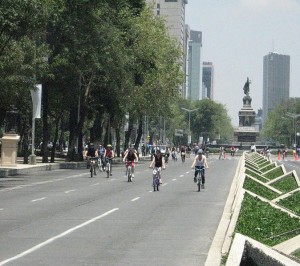
Transportation-related issues present a serious challenge to improving the quality of life for Mexico City’s 19 million residents. Of the 2.5 million tons of pollutants emitted into the city’s air each year, more than 80% is from cars and other motorized vehicles. Though only 20% of all daily trips in Mexico City are by car, 80% of its physical space is dedicated to travel by car.
ITDP is working with the Mexico City government to develop a Bicycle Master Plan that will strengthen cycling as a safe, attractive, healthy and convenient travel option for city residents. The goal of the Master Plan is to increase bicycle trips as a proportion of all trips to 2% by 2010 and to 5% by 2012.
To achieve this goal, the Master Plan project is undertaking a number of key actions:
- Mobility: design bicycle path networks with an eye for safety, attractiveness, and convenient access to higher-demand destinations and mass transit services; implement measures to calm automobile traffic;
- Universal access: facilitate easier door-to-door trip-making by strengthening connections between travel modes (e.g., bicycle parking at transit stations);
- Promotion: implement public campaigns that encourage bicycle use and raise its social status;
- Managing travel demand: provide disincentives for excessive car travel, such as congestion and parking pricing measures;
- Legal application: enforcing laws governing urban transportation